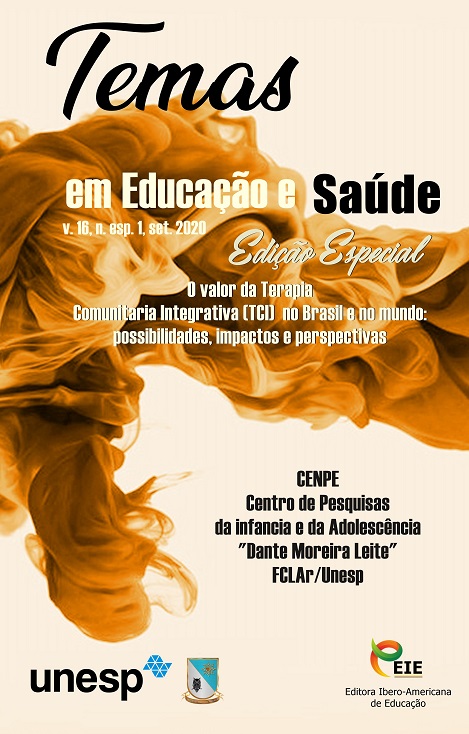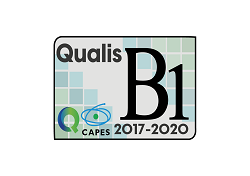Discourse analysis of binding wheel comments at a latin american university context
DOI:
https://doi.org/10.26673/tes.v16iesp.1.14305Keywords:
Discourse analysis, Inclusion, Resilience, Communication, Interculturality.Abstract
This research analyses the discursive characteristic of social binding wheels discourse made in the framework of educational and communicative processes with different social and educational agents from different indigenous communities, from Pastaza (Ecuador). This discursive analysis consists of a qualitative inquiry of quantitative data regarding the potential of integrative community therapy (ICT) and the binding wheels. It aims to assess their impacts, their achievements, their difficulties through a methodology of mixed quanti-qualitative cutting. The obtained results demonstrate that binding wheels allow self-reflection and communicative exchange, promote resilience, and evidence community empowerment. Finally, we consider (that) this analysis may be of special interest to improve educational and communicative strategies in intercultural educational context of the Ecuadorian Amazon, allowing social value analysis and promoting personal development.Downloads
References
AIJMER, B.; ALTENBERG, K. Advances in corpus in corpus linguistics. Amsterdam: Rodopi, 2002.
BARRETO, A. Terapia comunitaria integrativa paso a paso. Edición para Ecuador, 2015.
BIBER, D. A corpus-driven approach to formulaic language in english: multi-word patterns in speech and writing. International Journal of Corpus Linguistics, v. 14, n. 3, p. 275-311, 2009.
BIBER, D. Representativeness in corpus design. Literary and Linguistic Computing, v. 8, n. 4, p. 243-257, 1993.
BONDI, M.; SCOTT, M. Keyness in texts. Amsterdam: John Benjamins, collection Studies in Corpus Linguistics, 2010.
CHARAUDEAU, P. Dis-moi quel est ton corpus, je te dirai quelle est ta problématique. Corpus, v. 8, p. 37-66, 2009.
CHENG, W. Exploring corpus linguistics language in action. London, New York: Routledge, 2012.
ESPITIA, E. C. La fenomenología interpretativa como alternativa apropiada para estudiar los fenómenos humanos. Investigación y educación en enfermería, v. 18, n. 1, p. 27-35, 2000.
GUIRAUD, P. Problèmes et méthodes de la statistique linguistique. Paris: Larousse, 1960.
GUITIERREZ, R. et al. Impacto de las Ruedas Vinculantes en el contexto Universitario. Temas em Educação e Saúde, Araraquara, v. 13, n. 2, p. 335-347, 2017. Disponível em: https://periodicos.fclar.unesp.br/tes/article/view/9599. Acesso em: 7 ago. 2020. DOI: https://doi.org/10.26673/rtes.v13.n2.jul-dez.2017.9599
HABERT, B. Des corpus représentatifs : de quoi, pour quoi, comment? Linguistique sur corpus. In: BILGER, M. (Ed.). Études et réflexions. Perpignan: Presses Universitaires de Perpignan, n. 31, p. 11-58, 2000.
HALL, E. T. The hidden dimension. EEUU: Anchor books, 1990.
KERBRAT-ORECCHIONI, C. L'énonciation. De la subjectivité dans le langage. Paris: Armand Colin, 1980.
LEIVA, J.; GUTIÉRREZ, R. Prácticas pedagógicas para el fomento de la interculturalidad en el contexto universitario: la experiencia de la Universidad Estatal Amazónica en convenio con la Universidad de Málaga. Pastaza: Universidad Estatal Amazónica, 2018.
MARTÍNEZ SÁNCHEZ, R. Impacto de la terapia comunitaria integrativa y actividades de vinculación, como espacio de inclusión en el contexto universitario: el enfoque de abordaje de la interculturalidad en la Universidad Estatal Amazónica (Puyo, Pastaza, Ecuador). Trabajo de grado como requisito para optar al título de Máster en la Universidad de Málaga, España, 2016.
MÉRIC, O. Organisation discursive de la visite médiée de sites touristiques: théorisation contributionnelle et valorisation d’une praxis professionnelle. Orientador: Laurent Gautier. 2016. Tese (Doutorado em Ciências da Língua) – Université de Bourgogne, Dijon, França, 2016.
MORIN, E. Los sietes saberes necesarios para la educación del futuro. UNESCO, Paris: Le seuil, 1999.
OLIVEIRA, M. et al. Impacto y tendencias del uso de la Terapia Comunitaria Integrativa en la producción de cuidados en salud mental. Revista Eletrônica de Enfermagen, [En línea], v. 17, n. 2, p. 176-177, 2015. Disponível em: https://revistas.ufg.br/index.php/fen/article/view/37270. Acesso em: 07 ago. 2020. DOI: http://dx.doi.org/10.5216/ree.v17i2.37270
PASCAL, B. Pensamientos. Biblioteca virtual Universal, 2003. Disponível em: http://www.biblioteca.org.ar/libros/89354.pdf. Acesso em 07 ago. 2020.
PERY-WOODLEY, M. P. Quels corpus pour quels traitements automatiques? Traitement Automatique des Langues, v. 36, n. 1-2, p. 213-232, 1995.
REBOUL, A.; MOESCHLER, J. Pragmatique du discours de l'interprétation de l'énoncé à l'interprétation du discours. Paris: Armand Colin, 2005.
SANTANDER, P. Por qué y cómo hacer Análisis de Discurso. Cinta moebio [En línea], n. 41, p. 207-224, set. 2011. Disponível em: http://www.moebio.uchile.cl/41/santander.html. Acesso em: 07 ago. 2020.
SAYAGO, S. El análisis del discurso como técnica de investigación cualitativa y cuantitativa en las ciencias sociales, Cinta moebio [En línea], n. 49, p. 1-10, 2014. Disponível em: http://www.moebio.uchile.cl/49/sayago.html. Acesso em: 07 ago. 2020.
TEUBERT, W. Comparable or parallel corpora? International Journal of Lexicography, v. 9, n. 3, p. 238-264, 1996.
TOGNINI-BONELLI, E. Corpus linguistic at work. Amsterdam: John Benjamins, collection Studies in Corpus Linguistics, 2001.
UNIVERSIDAD ESTATAL AMAZÓNICA. Modelo educativo complejo de la UEA. Puyo, Ecuador, 2012. Disponível em: https://www.uea.edu.ec/wp-content/uploads/2019/08/MODELO_EDUCATIVO-UEA2019.pdf. Acesso em: 07 ago. 2020.
Published
How to Cite
Issue
Section
License
Os manuscritos aceitos e publicados são de propriedade da Temas em Educação e Saúde. Os artigos publicados e as referências citadas na Temas em Educação e Saúde são de inteira responsabilidade de seus autores. É vedada a tradução para outro idioma sem a autorização escrita do Editor ouvida a Comissão Editorial.







